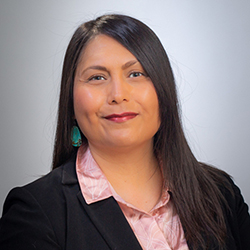Biography
Rebecca Rae is Jicarilla Apache from Dulce, NM. She is a Research Lecturer III with the College of Population Health and Associate Director of Indigenous Research, Evaluation, and Strategic Planning with the Center for Participatory Research. She is an Indigenous scholar with over 15 years of experience in developing prevention and intervention programs utilizing Community Based Participatory Research (CBPR) and implementing Indigenous participatory evaluation in partnership with tribes locally and nationally. Conducting CBPR with tribal communities requires that tribal health priorities drive the research and tribal sovereignty is at the forefront of the research process. Relationship building, trust, and equal partnerships are essential facilitators for developing and implementing successful CBPR projects in Tribal communities. As an Indigenous researcher and evaluator, she works thoughtfully and closely with multiple tribal community partners to help strengthen and enhance community members’ capacity in research, program development, program implementation, facilitation, data collection, analysis, grant writing, and evaluation. Enhancing and building the skills of community members to address various health concerns promotes enhanced community-engaged efforts and is an important contribution in addressing health inequities.
Areas of Specialty
- Indigenous Health
- Indigenous Research & Evaluation Methodologies & Methods
- Community Based Participatory Research
Key Publications
- Belone, L., Rae, R., Hirchak, K., Cohoe-Belone, B., Orosco, A., Shendo, K., & Wallerstein, N. (2020). Dissemination of an American Indian culturally centered community-based participatory research family listening program: Implications for global Indigenous well-being. Genealogy.
- Belone, L., Orosco, A., Damon, E., Smith-McNeal, W., Rae, R., Sherpa, M. L., Myers, O.B., Omeh, A.O., & Wallerstein, N. (2017). The piloting of a culturally centered American Indian family prevention program: a CBPR partnership between Mescalero Apache and the University of New Mexico. Public Health Reviews, 38(30), 13.
- Rae, R., Jones, M., Handal, AJ., Bluehorse-Anderson, M., Frazier, S., Maltrud, K., Percy, C., Tso, T., Varela, F., Wallerstein, N. (2016). Healthy Native Community Fellowship: An Indigenous leadership program to enhance community wellness. International Indigenous Policy Journal, 7(4).
- Belone, L., Tosa, J., Shendo, K., Toya, A., Straits, K., Tafoya, G., Rae, R., Noyes, E., Bird, D., Wallerstein, N. (2016). Community based participatory research principles and strategies for co-creating culturally centered interventions with Native communities: A partnership between the University of New Mexico and the Pueblo of Jemez with implications for other ethno-cultural communities. In N. Zane, F. Leong & G. Bernal (Eds.), Culturally Informed Evidence Based Practices, 26(1): 117-135.
- Belone, L., Oetzel, J. G., Wallerstein, Tafoya, G., Rae, R., Rafelito, A., et al. (2011). Using participatory research to address substance use in an American Indian community. In L. R. Frey & K. Carragee (Eds.), Communication Activism (3rd ed). Cresskill, NJ: Hampton Press.
- Jones, M., Rae, R., Frazier, S., Maltrud, K. Varela, F., Percy, C., & Wallerstein, N. (2010). Healthy Native Communities Fellowship: Advancing leadership for community changes in health. The IHS Primary Care Provider, 35(12): 279-284.
- Wallerstein, N., Oetzel, J., Belone, L., Tafoya, G., & Rae, R. (2008). CBPR: What predicts outcomes? In M. Minkler & N. Wallerstein (Eds.), Community-Based Participatory Research for Health: From Process to Outcomes (2nd ed.). San Francisco: Jossey-Bass.
Research
Primary research interests include Indigenous health, Indigenous research & evaluation methodologies, youth leadership, and CBPR intervention/prevention research with Indigenous communities.
Center for Participatory Research https://cpr.unm.edu
- Principal Investigator (PI) of the Kha’p’o Owingeh RezRIDERS evaluation contract, funded by Department of Justice’s Office of Juvenile Justice and Delinquency Prevention (OJJDP). RezRIDERS is a year-round leadership program tailored to engage Native youth in extreme sport activities that fills a gap in substance abuse prevention by linking culturally centered practices that integrate core value development and lessons, holds dialogue on optimism and hope for the future, incorporates team building that promotes social networks, and builds upon tribal duties and expectations.
- Principal Investigator (PI) of the Quartz Valley Indian Reservation Youth & Family Tree Project evaluation contract, funded by SAMHSA. The purpose of project is to enhance and expand comprehensive treatment, early intervention, and recovery support services for adolescents (ages 12-18), transitional aged youth (ages 16-25), and their families/primary caregivers with substance use disorders (SUD) and/or co-occurring substance use and mental disorders.
- Principal Investigator (PI) of the Tribal Data Champions Fellowship, funded by the W.K. Kellogg Foundation, is a yearlong community of practice that provides trainings on Indigenous evaluation methodologies, methods, Indigenous data sovereignty and data skill development to enhance evaluation capacity for tribal community members. The trainings are centered in an Indigenous framework that is driven from Indigenous worldviews that acknowledges holistic, collectivism, community oriented, and spiritual measures to define healthy communities.
- Co-Principal Investigator (PI) of the New Mexico Research and Learning Team (NM REAL), W.K. Kellogg Foundation Consulting Contract. Provide evaluation services and technical assistance to strengthen WKKF-funded projects in New Mexico, enhance the effectiveness of grant making in the state, and inform public policy through learning and evaluation in the primary areas: Employment Equity; Early Childhood Education; Maternal Child Health; Food, Health and Well-Being; and Racial Equity.
- Co-investigator with the Family Listening/Circle Program over two NARCH funding cycles (U26IHS300287/04 & U26IHS300009A) that developed the culturally centered family curriculum and current funding from the National Institute on Drug Abuse (NIDA 1R01 DA037174-04) to rigorously test the Family Listening Program curriculum.
- Senior Faculty with the Santa Fe Indian School’s Leadership Institute/Summer Policy Academy at the Princeton School of Public and International Affairs at Princeton, University. Conducted lecturers to Native youth on Indigenous health issues, Federal Indian History, policy and law, and research skills. Cohorts of students over 12 years have developed position papers and presented them to New Mexico congressional delegates in Washington D.C. advocating for policies and funding of diabetes/obesity prevention efforts, protection of sacred sites, suicide prevention, Indian water rights, youth leadership, and community planning.

